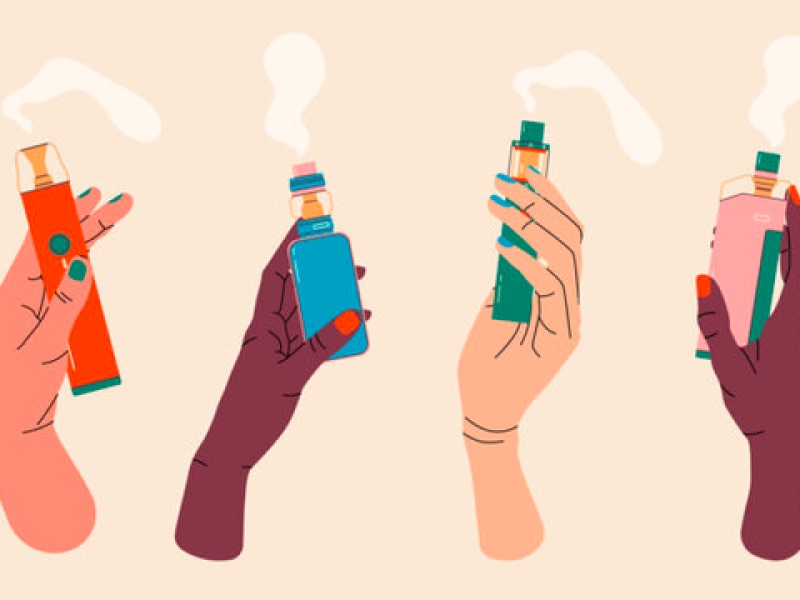With the recent changes in vape sensors in the bathrooms, the CSArtisan interviewed Mr. Metoyer to clear up rumors circulating around the campus, detecting what’s true and what’s false.
What factors led to the decision to invest in the detectors?
Student, parent, and teacher feedback over the past couple of years. And while we were doing focus groups and research for our most recent WASC accreditation. So this work started before I got here a couple of years ago. And that work led our team to believe one of the best ways to address what I heard was a pervasive amount of smoking.”
What process do students go through when these detectors are used for investigation?
Our practice and it’s an evolving practice… But our practice right now is: if the vape detectors go off at a certain level, that indicates that there might be some vaping going on. Our staff is immediately informed, and security brings that student to the office for a quick search. We try to do them as quickly as possible. And then students get to go back to class. However, we live in an imperfect world, and I’m an imperfect person who also has scheduled meetings. So if there’s a meeting, if I’m in a meeting, and someone gets brought in, sadly, we will ask that person to wait because it’s not realistic to send that person back if they’re suspected of having done this thing.”
If a vape device is found, how is the situation typically handled?
There’s an ED code against students having tobacco products, marijuana products, drug paraphernalia, and those types of things on campus. They’re held accountable, according to the ED Code. Typically, that’s suspension. I can’t think of when it hasn’t been a suspension in my tenure… We believe in restorative practices here. So a student who is suspended does earn demerits, but has an opportunity to make those demerits go away through the use of a Restorative Action Plan, which is 100%, the student’s responsibility to opt in and participate in.”
What are some examples of some things that might be in the Restorative Action Plan?
People have written songs, content therapy, done things around the house for their parents, and volunteered to work extra time at the front desk. One person did beach cleanup. Others have done PowerPoint presentations. One person did an analysis on parking practices. So it would be impactful for them as it relates to why a student received that type of suspension.”
What data has been gathered before and after implementing the vape sensors?
Since full implementation in early January, from that week to the next week, the number of detections went down by 50%. By the next week, it went down 50%. And the next week, it probably went down 70%. So either we’ve gotten better at gaming the system, or we’re choosing to make better choices, I’m hoping we’re choosing to make better choices. But I’m realistic, and understand that people have been smoking in bathrooms and high schools since before I was born… It’s my hope that it’s gotten a little better. At the end of the year, I’ll probably do like some many focus groups and try to talk to some students and see what they’ve seen from January to June, and see where we’re at.”
What is the most commonly confiscated item?
Lighters and nicotine vapes. A lighter alone is a suspension; it’s one of those things in the ED code listed under like cigarette products.”
How does the vape system discern between substances?
We get a report from the base detector system. It has different types of particles where it will say, this might be more likely this. And that differentiates between colognes, Nicotine, and marijuana. But the system is also there to detect noise and keep students safe…So in case there’s a bunch of people screaming, which is typical high school behavior, there’s noise peaks.”
Why have some students have had their phones taken?
Because it’s an investigation about what happened within the bathroom at that time. We found that sometimes these investigation leads to other people who aren’t in the hallway at that time…When students have their phones, misinformation gets posted on the internet. People get told to go hide your drugs, and it negatively impacts our ability to get some real information. It’s not a confiscation. We hold it. We don’t go into it. We don’t do anything. The minute that we’re done with that investigation, bone comes back.”
What are the resources or support available for students dealing with substance-related challenges on campus?
All of our counselors have access to information and direct support for students who are struggling with drug use… there’s also a Wellness Center. We have a thing called Care Solace, which is a free referral service for anyone in our organization, not just students, but teachers and any of our people that need some direct support”

 Blame It on the Rain
Blame It on the Rain